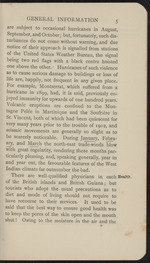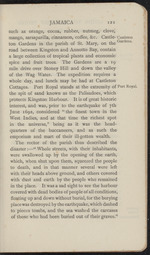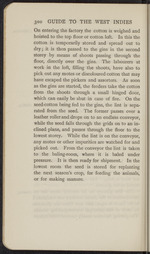| 1 |
 |
“...rendering these months par-
ticularly pleasing, and, speaking generally, year in
and year out, the favourable features of the West
Indian climate far outnumber the bad.
There are well-qualified physicians in each Health,
of the British islands and British Guiana; but
tourists who adopt the usual precautions as to
diet and mode of living should not require to
have recourse to their services. It used to be
said that the best way to ensure good health was
to keep the pores of the skin open and the mouth
shut! Owing to the moisture in the air and the...”
|
|
| 2 |
 |
“...Palisadoes, which
protects Kingston Harbour. It is of great historic
interest, and was, prior to the earthquake of 7th
June 1692, considered “the finest town in the
West Indies, and at that time the richest spot
in the universe,” being as it was the head-
quarters of the buccaneers, and as such the
emporium and mart of their ill-gotten wealth.
The rector of the parish thus described the
disaster“ Whole streets, with their inhabitants,
were swallowed up by the opening of the earth,
which, when shut upon them, squeezed the people
to death, and in that manner several were left
with their heads above ground, and others covered
with dust and earth by the people who remained
in the place. It was a sad sight to see the harbour
covered with dead bodies of people of all conditions,
floating up and down without burial, for the burying
place was destroyed by the earthquake, which dashed
to pieces tombs, and the sea washed the carcases
of those who had been buried out of their graves.”...”
|
|
| 3 |
 |
“...the top floor or cotton loft. In this the
cotton is temporarily stored and spread out to
dry; it is then passed to the gins in the second
storey by means of shoots passing through the
floor, directly over the gins. The labourers at
work in the loft, filling the shoots, have also to
pick out any motes or discoloured cotton that may
have escaped the pickers and assorters. As soon
as the gins are started, the feeders take the cotton
from the shoots through a small hinged door,
which can easily be shut in case of fire. On the
seed-cotton being fed to the gins, the lint is sepa-
rated from the seed. The former passes over a
leather roller and drops on to an endless conveyor,
while the seed falls through the grids on to an in-
clined plane, and passes through the floor to the
lowest storey. While the lint is on the conveyor,
any motes or other impurities are watched for and
picked out. From the conveyor the lint is taken
to the baling-room, where it is baled under
pressure. It is then ready for...”
|
|
